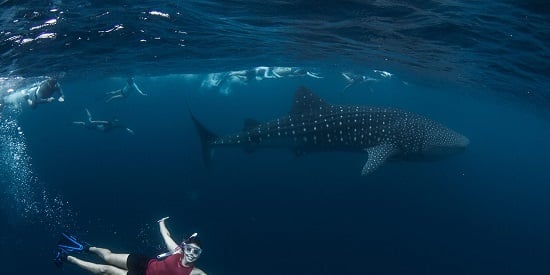Deakin graduate steps into the world of whale sharks
Deakin newsYohanna Aurisch hasn’t walked on the moon but she thinks swimming with whale sharks might be just as memorable.
The Deakin University Warrnambool Campus graduate is living her dream as a ‘mermaid’ leading tourists on whale shark spotting expeditions on the Ningaloo reef in Western Australia.
“To see an animal eight times your size is amazing,” Yohanna said. “You just have to get out of its way as it swims by. It’s like walking on the moon; like you’re on another planet.”
“It takes your breath away the first time you jump in the water. You’re in deep blue water and you can’t see anything and then the whale shark comes looming at you with its mouth wide open filter feeding. It’s so graceful and peaceful. It looks like it has no worries in the world.”
Although whale sharks are the largest known fish species, they are purely filter feeders and it’s safe to snorkel with them, keeping a regulated distance of four metres.
“It’s an amazing job on the most amazing reef in the world,” Yohanna said. “I’ve been blessed with every job I’ve had and I wouldn’t be where I am if it wasn’t for my Deakin course.”
Next year Yohanna plans to share her love of whale sharks by doing a cross-country cycling marathon to raise money for research, mental health and diabetes. Her connection stems back to 1996. “We were on a family trip around Australia in a campervan and went to Exmouth but unfortunately the weather was really bad so we weren’t able to go out and see a whale shark.”
“My mother bought a whale shark poster for me and 21 years later I still have it. That started my love with marine biology and the environment in general, even though I was a mountain girl raised in Belgrave.”
Yohanna had several options open to her but chose to study Environmental Science and major in marine and freshwater science at the Deakin University Warrnambool Campus.
“I didn’t think my options would be as good if I just did a marine science course,” she said. “I’m so glad I chose Deakin because I’ve been able to work in so many organisations.”
After completing her course in 2005, Yohanna worked as an interpretation officer at the Melbourne Aquarium, field operations and volunteer program manager for Earthwatch Australia, volunteers coordinator at Parks Victoria in the Alpine National Park and with scientist Brad Norman’s Ecocean whale shark research. She now mainly works for Ningaloo Ecology Cruises’ glass bottom boat tours and for King’s Ningaloo Reef Tours.
“The degree has allowed me to do so many amazing things,” Yohanna said.
During her cycling marathon, Yohanna will raise money for Ecocean, along with Beyond Blue and Diabetes Australia. Yohanna has type one diabetes.
She will start from Exmouth during the 2018 Whale Shark Festival and plans to travel as much as possible along the coastline. She also hopes to call in on her old university campus in Warrnambool.
Coincidentally, fellow Deakin graduate Zoe Gillan also works for King’s Ningaloo Reef Tours.
Zoe graduated from Deakin in 2011 after spending her final semester studying abroad in Hawaii. She is currently in her third year in Exmouth and working as a whale shark interaction guide with Kings Ningaloo Reef Tours.
The pair feature in a new fundraising whale shark mermaids calendar, photographed by Yohanna’s partner Leith Holtzman.
To promote the ride, Yohanna has been photographed riding her bike underwater with whale sharks.
“I’m probably the first person in the world to ride their bike with a whale shark,” she said. “We tried different floatation devices and eventually used child arm floaties so it wouldn’t sink, with the help of Zoe and King’s Ningaloo Reef staff.”
“I’ve been trained to hold my breath and the whale shark came along at a perfect time. We had approval from Parks and Wildlife and made sure we did everything properly,” she said.
“The photo represents my trip; looking at mental health with the deep blue, my favorite animal and if you have a clear head you can look after your body, your family and the rest of the world.”
Share this story

